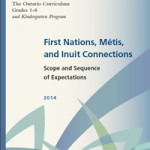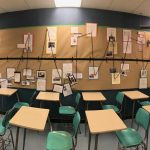
Doing History is a feature in which Risa Gluskin e-interviews people who use history on the job.
What does This Land Archaeology, Inc. do?
I am currently employed by a consulting archaeology firm that works for land developers all over Southern Ontario. Current provincial legislation requires all land developers to undertake an archaeological assessment on the properties they intend to develop. These assessments determine whether there are any previously discovered archaeological sites on the property or whether the property holds ‘archaeological potential’ and may contain a site that has yet to be discovered. The company I work for is contracted by these land developers to conduct the archaeological assessment, report to the Ministry of Tourism, Culture and Sport on any findings (or lack thereof) and provide the developer with a ‘letter of clearance’ that they will then use to obtain approval for their development.
What kind of historical research do you do at This Land Archaeology, Inc.?
My job is to conduct the historical research for the Stage 1 and Stage 3 assessments. The historical research for a Stage 1 assessment involves tasks such as reviewing historical mapping from the nineteenth century to determine whether there were any structures on the property, providing a summary on the general history of the locality and checking whether there are any designated heritage structures or cemeteries on the property. The historical research for a Stage 3 assessment involves a more detailed investigation of the property where I consult various land record sources to pin down the ownership history of the property. Both the Stage 1 and 3 historical research give the archaeologist a historical context for the land that helps inform their assessment in the field.
What is an archaeological assessment? Do you participate in assessments? If so, how?
An archaeological assessment is a four stage system with the work proceeding to subsequent stages depending on what you find. For example, if the Stage 1 historical research suggests the property holds ‘archaeological potential’ then a Stage 2 assessment is recommended. If significant ‘archaeological resources’ are found during Stage 2 then Stage 3 work is recommended, so on and so forth. Whether a site will proceed to the next stage is based on guidelines provided by the Ontario Ministry of Tourism, Culture and Sport.
While I provide the historical background for the studies, I do not currently participate in the field work part of the assessment.
Are there many examples of great finds?
Yes – we come across so many great finds, which may come as a surprise because I don’t think Canada is often associated with being ‘archaeologically rich’ in the public’s mind. While we aren’t digging up Camelot or Elizabethan coins, we are continually discovering artifacts that speak to a rich First Nations and Euro-Canadian culture. We come across stunning pieces of pottery with decorative designs, ceramic household items, coins, bottles, the list goes on! One of my favourite finds was a leather pouch containing a number of 19th century coins that we found in a privy (outhouse). Whoever dropped it must have been very upset!
Do you get to go on site? If so, what do you do there? Is there a particular dig that sticks out in your mind?
Before I took over the historical research I spent some time out in the field. As part of the field crew I was mainly responsible for digging and sifting through the dirt using a screen with mesh that allows the dirt to fall through while larger artifacts remain. There isn’t a particular dig that stands out in my mind but I do remember some of my favourite finds from that time. One was uncovering a number of leather shoe soles from a homestead dating circa 1850. I also remember digging up the face of a child’s porcelain doll and coming across a long lost wedding ring.
http://archaeologymuseum.ca/archaeology-flotation/ (Museum of Ontario Archaeology)
How did your history education prepare you for the work you currently do?
My education in history was absolutely central in preparing me for the job I do now. My undergrad first and foremost taught me how to research effectively. It gave me a clear understanding of how to gather information on an unknown topic, relate that information to the task at hand and summarize it in a digestible way. It also taught me how to be critical of information to ensure my work paints an accurate picture of the past. I would also say that an education in history made me a more detail oriented person, as a small observation in research can often lead to big revelations – you learn not to overlook the small stuff.
How do you describe the difference between history and archaeology?
I think they are two sides of the same coin. Both seek to uncover our past, however, each discipline goes about it in a different way. History leans primarily on textual evidence to understand our past while archaeology focuses on physical evidence. For example, a diary entry from the 1850s may describe how the author enjoyed a hot cup of tea in a decorated ceramic cup, therefore the historian concludes that “ceramic tea cups were commonly used by early Euro-Canadian settlers during the nineteenth century”. The archeologist, on the other hand, digs up a number of ceramic cup fragments and therefore concludes that “cermic tea cups were commonly used by early Euro-Canadian settlers during the nineteenth century”. Their conclusions are the same but their approach is different. Although that is not to say history and archaeology always agree – there is often lots of debate and conflicting findings, but you see what I’m getting at.
Do you have any advice for students wanting to pursue a post-secondary degree in history or archaeology?
Coming from a post-secondary degree in history, and currently working on my Master’s Degree in the same area, my advice to students would be to resist the idea that an education in history doesn’t open any doors aside from teaching. As a practicing historian you learn how to master any topic you are interested in – Roman military strategy, Mexican culture, Revolution… your options are limitless in many ways. Studying history teaches you how to begin with little to no knowledge of something and end with a comprehensive understanding. So, while you may not be able to apply your knowledge of the French Revolution to that Brand Manager position you want at Maple Leaf Foods, you can apply the same learning process. Although you know nothing about Maple Leaf Foods, your history degree has taught you how to learn. So, using your skills, you can acquire a comprehensive understanding of the company which will allow you to impress them in an interview and inevitably succeed at the job.
History is therefore an incredibly useful framework for educating as its vastness as a discipline lends well to providing students with abundant post-degree opportunities.


